There are 19 good companion plants for blackberries in this list as well as 5 plants you should avoid. While you can plant blackberries on their own, pairing them with companions goes a long way to achieving a healthier garden.
Blackberries are a few of the easier fruit-bearing shrubs to plant and maintain. Native to North America, they grow well in warm summer days, cool nights, and high moisture areas. In addition to the interest they add to the garden, blackberries pack great flavors similar to raspberries. Their dark and rich drupes pack a blend of tart and sweet flavor, making them great for various summer treats. Blackberries work great, whether in smoothies, jams, ice cream, or baked goodies.
However, the best part of growing blackberries in your garden is how they pair with a range of plants. These shrubs survive in various climates and soil conditions. So, their flexibility accommodates different plants, whether canopy trees or ground-covering herbs.
Now, to help you achieve the perfect blackberry garden setup, we’ve put together a detailed guide on their companionship. Here’s a complete guide of the best companion plants for blackberries to add to your garden TODAY.
Table of Contents
What are The Best Companion Plants for Blackberries?
The best companion plants for blackberries include blueberries, strawberries, alliums, herbs, fruit trees, oak trees, and wildflowers, to name a few. The best part of planting blackberries in your garden is that they come with a variety of plants you can pair them with.
Plus, there are plenty of ways to incorporate companion plants into your blackberry garden, thanks to their flexibility and versatility. In addition to forming clean shrub spaces to fit in ground covering herbs, blackberries begin to climb and spread wide when mature.
This means you can pair them with a range of other climbing plants for a visually appealing look when attaching trellis or stakes. Further, blackberries grow well with a host of attractive plants while taller fruit or oak trees add a canopy to their vines.
Below, we’ve outlined a complete guide to excellent blackberry companion plants.
19 Best Companion Plants for Blackberries
Blackberries are a fruiting plant that produces rich and dark edible fruits, also known as blackberries. Blackberries are part of the bramble family. A close cousin of raspberries, blackberries are rich in antioxidants. When it comes to their growth, blackberries are pretty versatile, surviving different conditions and pairing well with a myriad of plants.
Blackberries grow well in any soil condition with a nitrogen-rich fertilizer. However, they thrive best in loamy, well-drained soils. They also require soil pH of 5.5 to 6.8 and exposure to full sun for at least 6 to 8 hours. But, you want to refrain from planting blackberries in soil that has cultivated tomatoes, potatoes, eggplants, and some incompatible brambles.
With the right conditions, blackberries grow pretty well on their own. However, adding companion plants to your garden does wonders for all the plants you incorporate, including blackberries. Pairing blackberries with companion plants comes with many benefits.
These include boosting pollination, and increasing resistance to pests while enriching the soil with nitrogen and groundwater. Ideally, you want to add plants that repel pests that typically affect blackberries. These include Japanese beetles and aphids. Companion planting also boosts the fruit yield of your blackberries.
Here are the 19 incredible plants to help you harness these benefits when paired with blackberries;
1. Lower Brambles

Brambles are typically described as rough, tangled, prickly shrubs that grow blackberries, raspberries, or dewberries. However, roses also fall under the same categories. Most brambles fall under the Rubus genus.
Blackberries don’t grow well with several similar brambles, like raspberries. However, you can find a few that grow pretty well, particularly lower brambles. This is because lower brambles can easily tolerate the shade caused by higher ones, such as blackberries.
A good example of lower brambles includes thimbleberry, serviceberry, and hazelnut bushes. These lower brambles also add good color to your garden.
Other Berries
Blackberries pair well in the garden with other non-bramble berries.
2. Blueberries
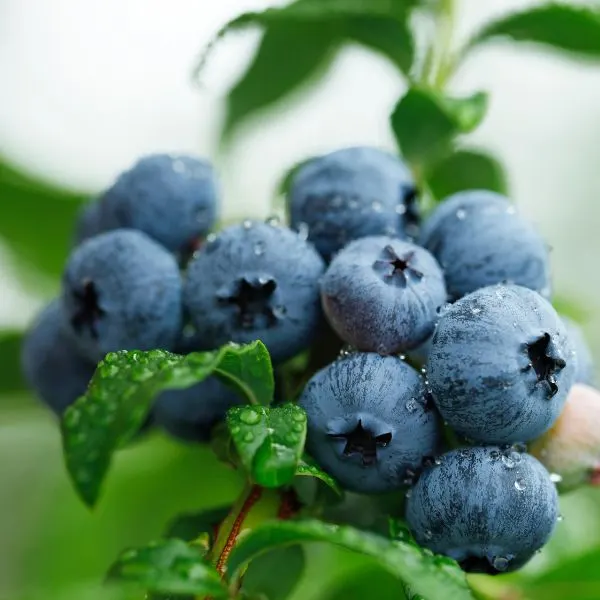
Blueberries have similar growing conditions as blackberries. Yet, the two plants don’t compete for resources since they don’t need the same nutrients to thrive. After all, blackberries are brambles while blueberries are a bush.
They are particularly excellent companion plants for blackberries because they attract beneficial plants that keep pests away. In fact, you can easily boost the rate of pollination by pairing these two plants together. Blueberries also protect the roots of blackberries from extreme temperatures by providing shade.
Tip: Blackberries love soil pH of 5.5 to 6.8 while blueberries like soil pH of 4.5 to 5.5. To satisfy the two plants, aim for a soil pH of 5.5.
3. Strawberries
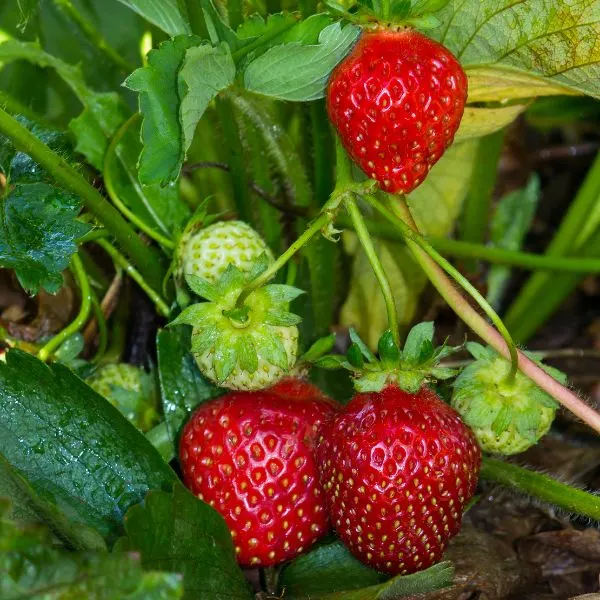
Like blackberries, strawberries like sandy loamy soils with high organic fertilizer, acidic soils, and long exposure to the sun. However, their companionship with blackberries has long been debated. While some gardeners believe strawberries are great companions for blackberries, others don’t.
This is because when growing, both plants may strive to produce more fruits, resulting in competition for resources. Nonetheless, planting strawberries and blackberries together harnesses many benefits, too.
Strawberries reduce weed growth by providing ground cover and also retain moisture while reducing topsoil erosion. Additionally, strawberries do a good job of complementing blackberries to increase pollination rates.
This means the two plants complement each other to produce a higher fruit yield, too. Further, during the cold season, strawberries and blackberries shed leaves you can use as organic matter to enrich the soil. To curb the issue of nutrient competition, simply grow the bushes a few feet apart to allow adequate nutrient supply to each.
Tip: Pairing strawberries and blackberries with compatible herbs, such as borage and thyme boosts their fruit yield even further.
4. Grapes
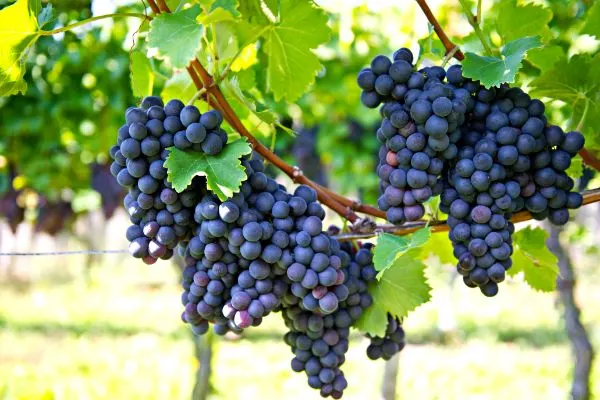
Due to their close relationship, blackberries and grapes grow very well together, particularly in a garden bed. When they begin to climb, make sure you separate the two plants to prevent them from getting entangled. However, in this case, grapes usually benefit the most.
They loosen the soil to allow easier grape root penetration and allow the plant to thrive. In fact, blackberries are commonly used in large grape vineyards as living mulch to support grape production.
Trees
A good number of canopy trees complement blackberries as they grow.
5. Fruit Trees
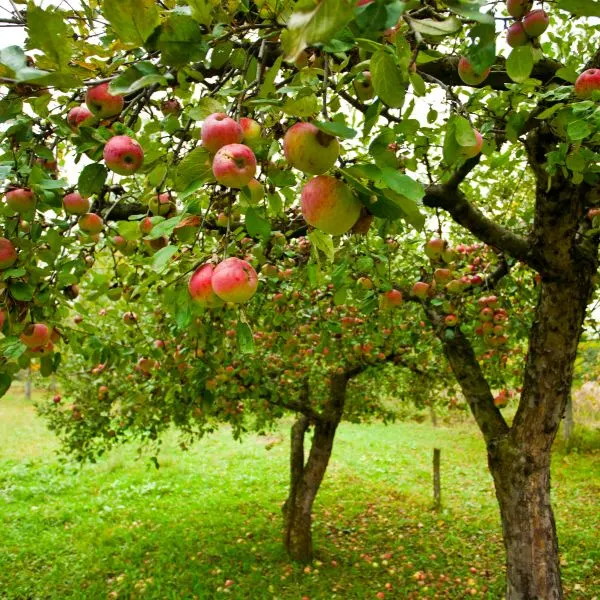
A good number of canopy trees grow well with blackberries. Fruit trees offer partial shade for blackberries, especially during hot weather. Additionally, fruit trees produce leaves that act as mulch to aid in temperature regulation, reduce evaporation, and provide fertilizer.
On the other hand, their roots improve soil conditions, loosening it and retaining moisture. Their flowers do an excellent job at attracting pollinators that benefit blackberries, too. When paired with fruit trees, blackberries also provide an understory layer to help reduce evaporation even further.
6. Nut Trees
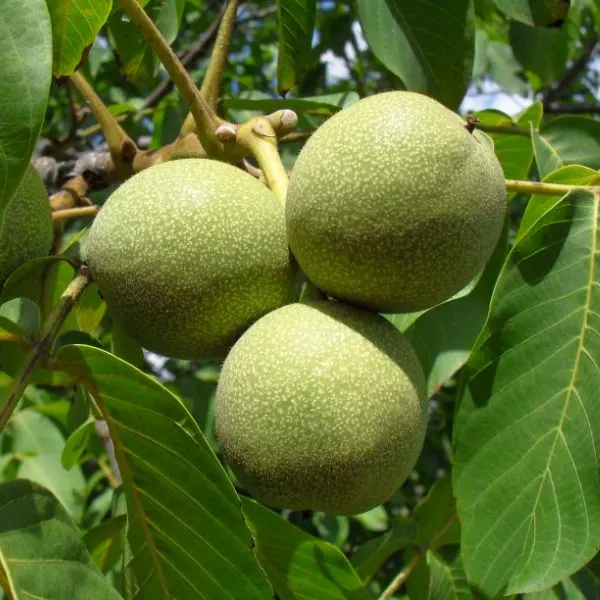
Like fruit trees, nut trees grow well with blackberries. You can plant blackberries, fruit trees, and nut trees in one place since they are all perennials. You can easily achieve this by maintaining rich and moist soil in the right climate.
7. Oak Trees
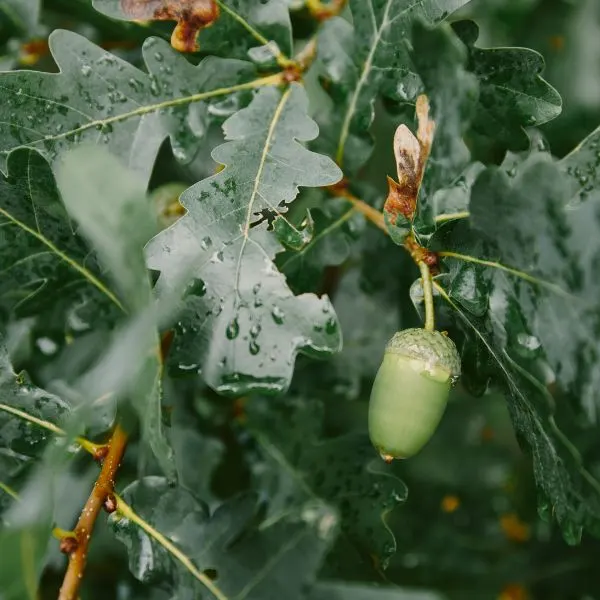
Growing in similar conditions (particularly sun and water needs), oak trees pair incredibly well growing with blackberries. These trees harbor a type of fungi, known as mycorrhizal, in their roots to help them retrieve and fix nutrients from the soil. The fungi also prevent the trees from developing diseases.
So, growing blackberries near oak trees reduces problems related to diseases. Since oak trees are bigger than blackberries, they also provide shade to protect against high temperatures during warmer seasons.
The shade keeps the blackberries cool and prevents leaves from burning. Once they die off, the oak tree leaves also enrich the soil. On the other hand, blackberries, particularly trailing blackberries, come with benefits for oak trees as well. They help break up and loosen the soil, retain moisture, and improve aeration so the roots of the oak trees can spread better.
Perennials
While blackberries add a colorful interest to the garden, pairing them with perennials transforms it into a floral haven.
8. Roses
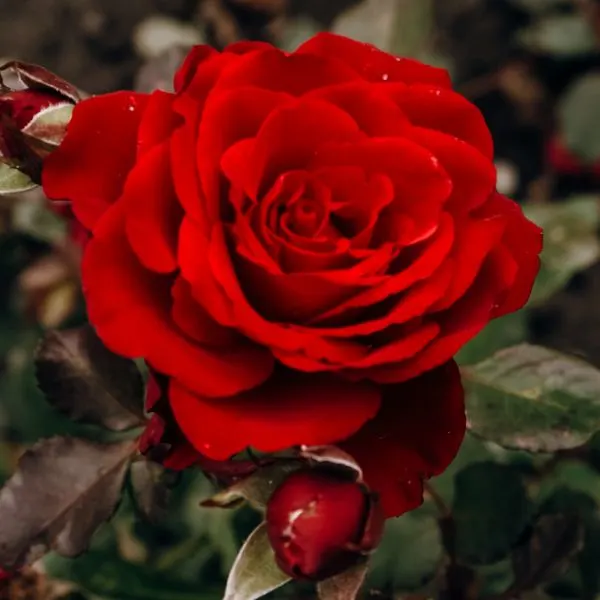
Plenty of perennials complement blackberries to add interest and attract beneficial insects, among other benefits. Part of the brambles family, roses add a beautiful pop of color to your garden.
9. Tansy
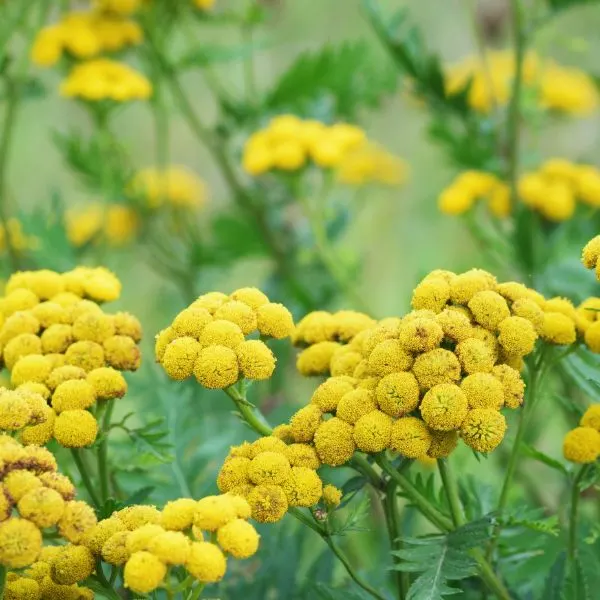
Tansy is an herbaceous perennial that grows beautiful yellow flowers and complements blackberries. Tansy is particularly effective at fixing the nitrogen in the soil to promote the growth of blackberries. This also improves flower production while the natural scent of tansy repels pests, such as aphids, cucumber beetles, ants, flies, and Japanese beetles.
These pests are infamous for preying on berries. But if you decide to incorporate tansy into your garden, you have to be extra careful. This is because tansy is poisonous and can be risky in households with small kids and pets.
10. Borage
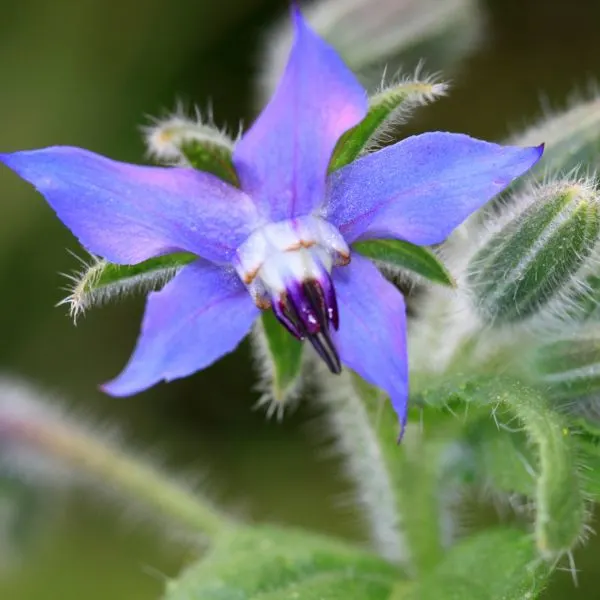
Another popular blackberry companion plant, borage grows blue, purple, and white flowers on tall stalks. This allows the flowers to tower over the much lower-growing blackberry flowers.
Also known as a starflower, borage helps to attract a wide range of pollinators, including bees and hoverflies. This also ensures that these insects deal with prey that may affect the berries.
11. Sunflowers
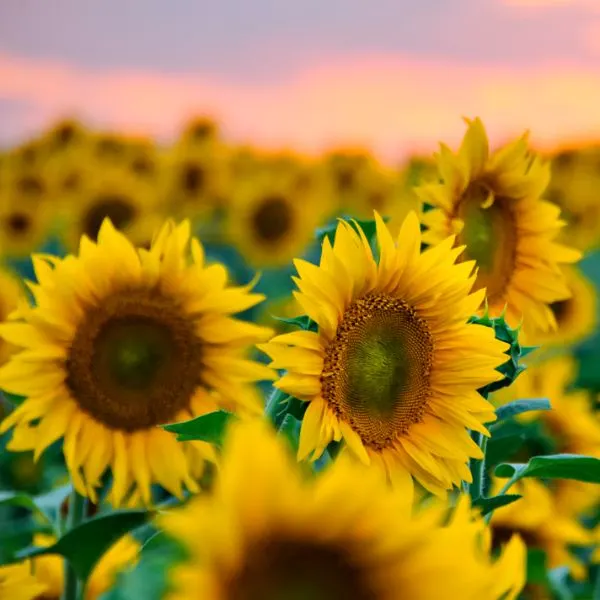
Sunflowers grow in a myriad of soil conditions and can tolerate slightly acidic to slightly alkaline soils (ph 6.0 to 7.5). These flowers also prefer exposure to the full sun. So, when paired with blackberries, these plants grow very well together.
But, you have to ensure you have ample garden space as stacking them in limited space may affect their growth and increase nutrient competition. Sunflowers can protect blackberries from large predators such as birds, rabbits, squirrels, and deer because it provides a visual barrier to the garden.
Sunflowers also produce a lot of nectar, resulting in attracting many pollinators. With a good number of pollinators, you can boost flower production for your berries, ultimately, increasing your fruit yield while reducing fruit drop.
Wild Flowers
Wildflowers are equally popular blackberry companion plants. Wildflower simply refers to flowering plants that aren’t genetically manipulated. When planted within a 25-foot range near blackberries, wildflowers do an excellent job at attracting pollinators due to their rich production of nectar and pollen. This ensures a wide variety of pollinators visit both wildflowers and blackberries.
12. Purple Coneflower
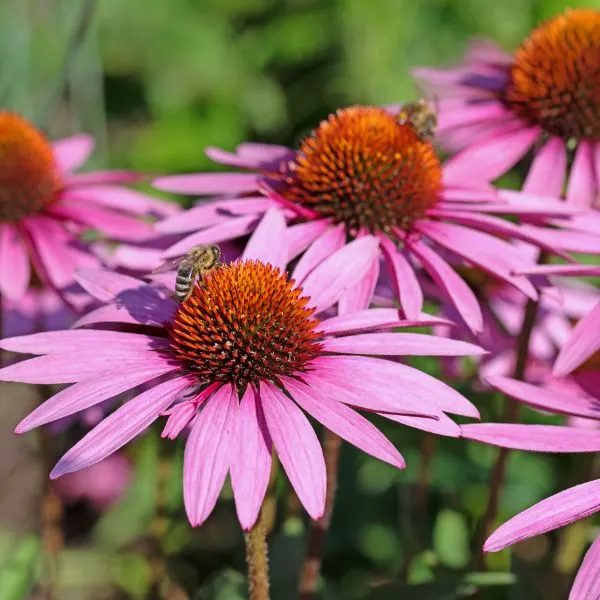
Also known as Echinacea, purple coneflowers produce large, showy, and colorful flowers. Member of the daisy family, purple coneflowers attract a good number of pollinators to your blackberries, particularly when planted within a 25-foot range. With a variety of pollinators, your pest problem would’ve been sorted.
13. Bee Balm
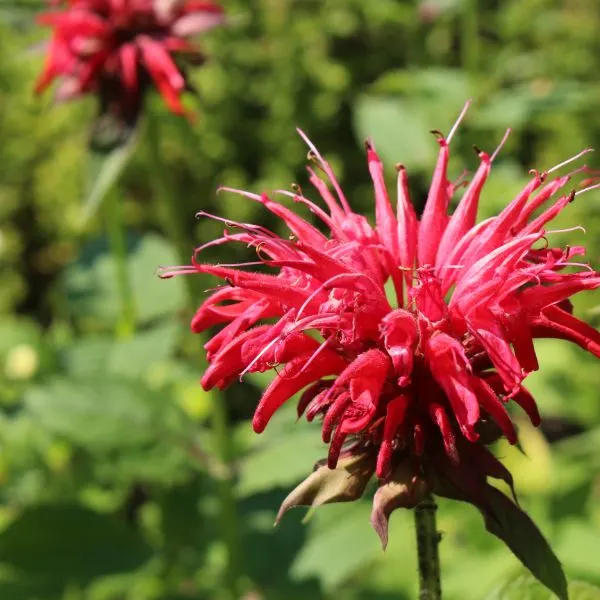
The perennial wildflower, bee balm, complements blackberries well as an ornamental plant. In addition to adding interest to your garden, bee balm attracts pollinators, particularly bees, just like its name suggests.
Just a few bee balm clumps are enough to produce adequate nectar for honey bees and other popular pollinators. Bee balm also grows deep roots that break the soil to boost drainage while preventing erosion.
Other popular wildflowers to pair with blackberries include meadow crane’s bill, daisies, poppies, Queen Anne’s lace, lupine, and black-eyed Susan.
Legumes
Not many plants pair well with legumes. So, blackberries are one of the many few that do so well.
14. Beans and Peas
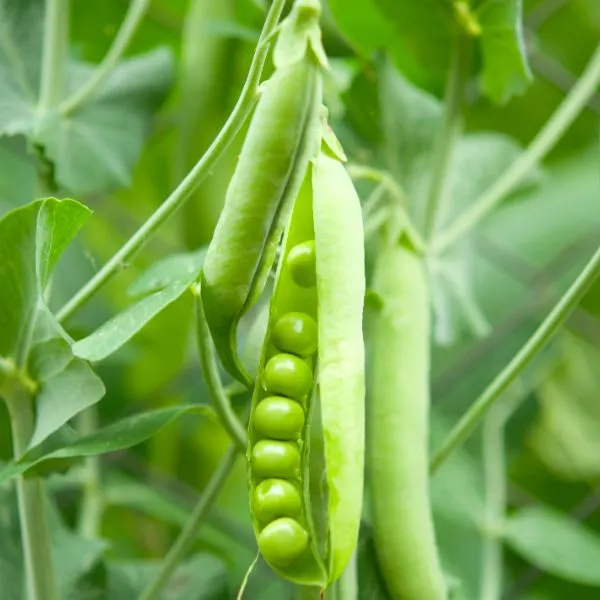
Beans and peas are among the popular legumes, incorporating options such as clover, peas, and runner beans. These plants are particularly great as ground cover, helping to protect against soil depletion. They delay soil erosion, retain water, prevent weed growth, and control pests and diseases.
Paring blackberries with beans or peas even improves fruit production. As cover crops, beans and peas promote nitrogen-fixing by allowing beneficial bacteria to extract nitrogen from the air and store it in the soil as nitrates. This, in turn, enriches the soil to improve the growth of different plants. After all, nitrogen-rich soil is one of the many components needed to harness healthy blueberry plants.
Ground cover crops also produce biomass that can be used as mulch for blackberries and other plants. Grow beans or peas alongside the blackberries in rows. After production, these plants die off, allowing you to plow them under and enrich your soil with nutrients from the dead plants.
Tip: If you want to avoid a messy-looking garden, avoid climbing varieties. Instead, opt for bush beans or bush peas.
15. Alliums
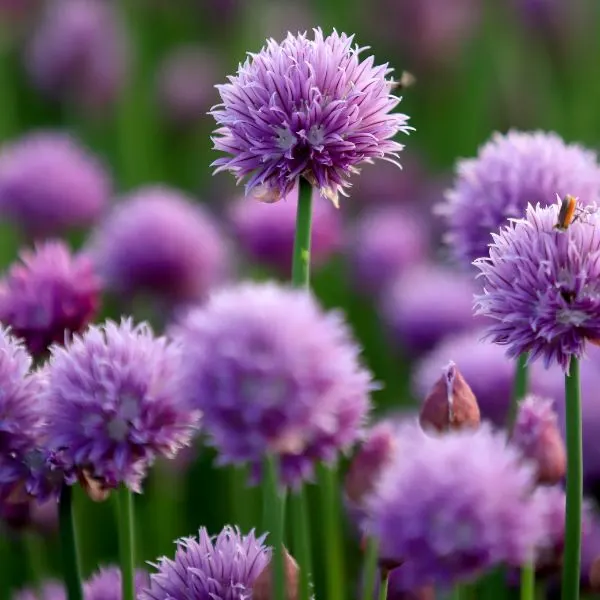
Plants from the alliums family, such as garlic, onions, spring onions, and chives, grow well with blackberries. They also use their strong aromas for the better good of their companion plants. Alliums boast a potent scent due to their naturally occurring sulfur.
When paired with blackberries, the strong-scented alliums repel pests and protect against diseases, thanks to their antibacterial and antifungal properties. Alliums are known to repel small and big pests, such as maggots, aphids, mites, rabbits, and deer, respectively.
Alliums are known to be so powerful that many manufacturers use their scents to make insect repellents. When it comes to their roots, alliums, especially garlic, onions, and chives grow shallow roots. This allows them to be planted closer to blackberries without any implications.
The best part of adding allium plants to your garden is that they grow well with any plant. This means that they inter pair well with other companion plants for blackberries. But, alliums don’t do so well when planted with legumes.
Herbs
Like legumes, herbs provide ground cover for blackberry bushes and allow you to incorporate many varieties. In addition to protecting the soil, ground-covering herbs also attract pollinators.
16. Hyssop
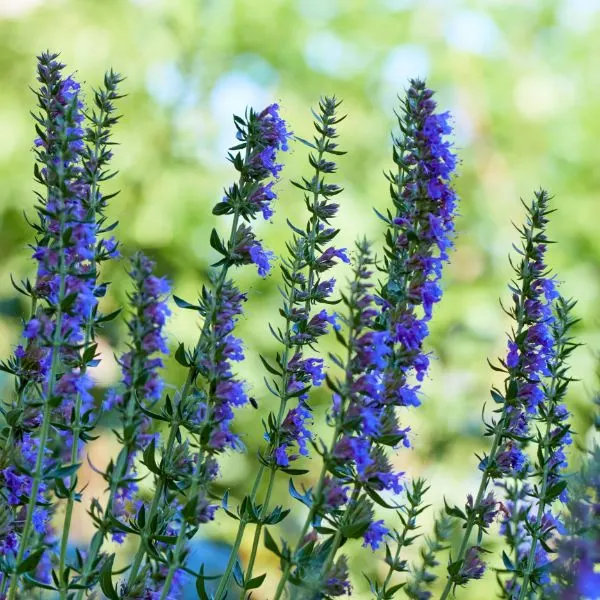
Hyssop perennial herbs grow beautiful tiny purple flowers with aromatic leaves prized for their culinary advantages. Their beautiful purple flowers also make hyssop plants great as ornamental plants in a flower bed or garden.
The aromatic scent of the hyssop leaves does a great deal to attract pollinators to your blackberry shrubs when you plant the two together. This, in turn, increases the berry patch yields. They also help to curb pest infestations from cabbage moths and flea beetles.
Tip: To enjoy the best results, pair blackberries with hyssop and alliums.
17. Lemon Balm
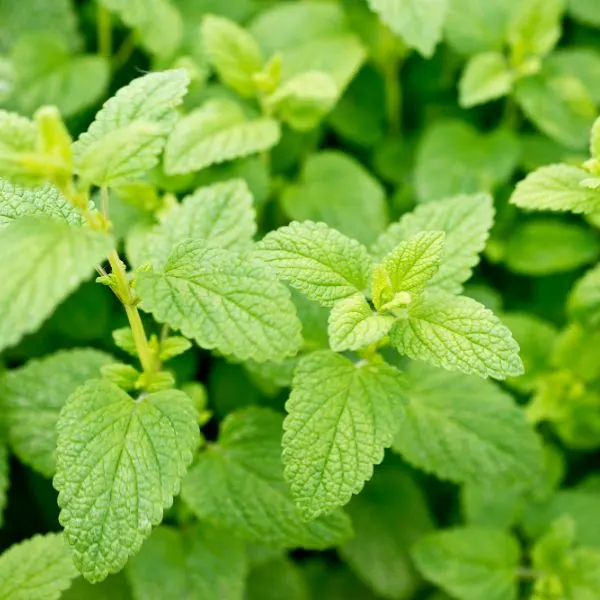
The lemon balm provides outstanding ground cover for blackberries while attracting pollinators. However, when planting lemon balm, you want to curb it as it can be invasive like mint. If you can’t commit to the occasional pruning, you can use pots to control the rapid growth and spread.
18. Mint
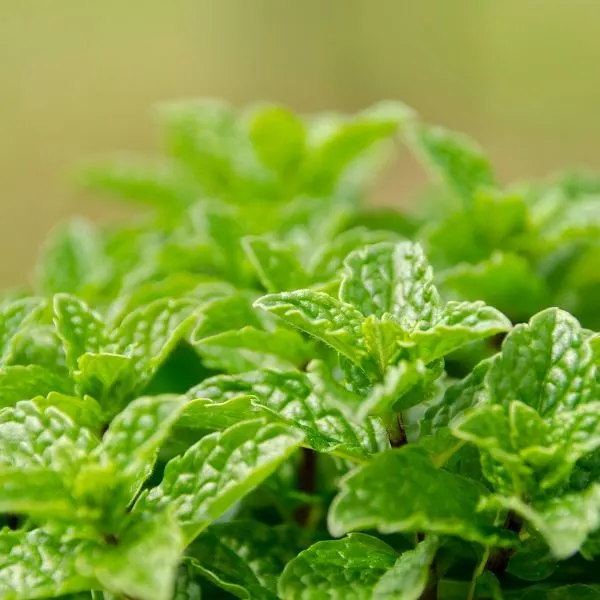
Closely related to hyssop, mint has similar growing conditions as blackberries and complements it pretty well. Mint contains menthol which gives it its strong scent and insect-repelling abilities. Planting mint in your garden alone is sufficient enough to repel mosquitoes.
They also deter other unwanted pests, such as aphids, ants, cabbage moths, and mice. On the other hand, when they grow flowers, mint plants attract pollinators. Mint is also an ideal living mulch, thanks to its natural moisture-retaining properties. Dead mint leaves enrich the soil with nutrients to promote the production of blackberry drupes.
Additionally, planting mint near blackberry plants improves the taste of the berries by masking the typical tartness. But, like lemon balm, mint grows and spreads pretty fast to become invasive. It develops runners on the topsoil that spread at a high speed when left alone.
So, you want to control its growth by cutting it back occasionally. You can also control the runners by potting your mint.
Tip: Pair blackberries with mint, alliums, cabbage, and lettuce for the best growing results.
19. Thyme
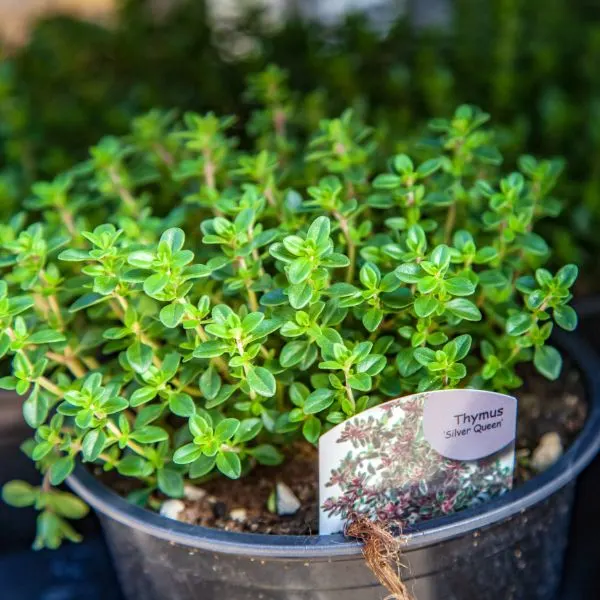
Native to Eurasia and dating its origin as far as 2750 BC, thyme has become a popular herb in the western world. This drought-tolerant plant grows flowers and scented leaves that attract pollinators, such as honey bees. When grown near blackberries, they boost pollination rates and grow the yield.
Thyme also repels pests, such as weevils, cabbage loopers, and cabbage worms. Further, the herb reduces aphid attacks by attracting ladybugs, who love to feast on aphids. Thyme does an impressive job growing near blackberries, strawberries, and Brassicas for the best results.
5 Worst Companion Plants for Blackberries
Blackberries grow and complement pretty great with multiple plant groups. However, these fruit-bearing shrubs also don’t grow well with several other plants. For one, you want to NEVER plant blackberries in soils that have harvested nightshades such as tomatoes, potatoes, peppers, or eggplants, and fellow brambles, such as raspberries.
This is because these sols may contain pathogens that are detrimental to the growth and development of new blackberry plants. Still, the list is alittle bigger than this. Here are the worst companion plants for blackberries to avoid paring with the fruit-bearing shrubs;
1. Nightshade Vegetables
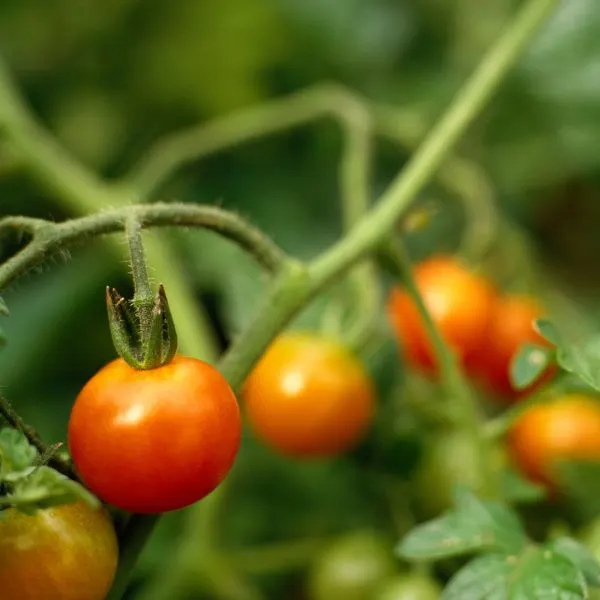
Nightshades refer to flowering plants (including annuals and perennials, vines, shrubs, and trees), such as potatoes, tomatoes, and eggplants. These plants typically share similar pests as blackberries. So pairing them increases the chances of pest infestations from aphids, caterpillars, stink bugs, armyworms, and hornworms, to mention a few.
Because they attract similar pests, nightshade vegetables can also transfer their diseases to blackberries. When it comes to soils that nightshades have been harvested from, you should never replant blackberries there.
This is because nightshades are prone to contamination from fungal diseases. So when you replant blackberries in the same soils, you can easily risk contamination, transferring the diseases to the newly planted blackberries.
2. Similar Brambles
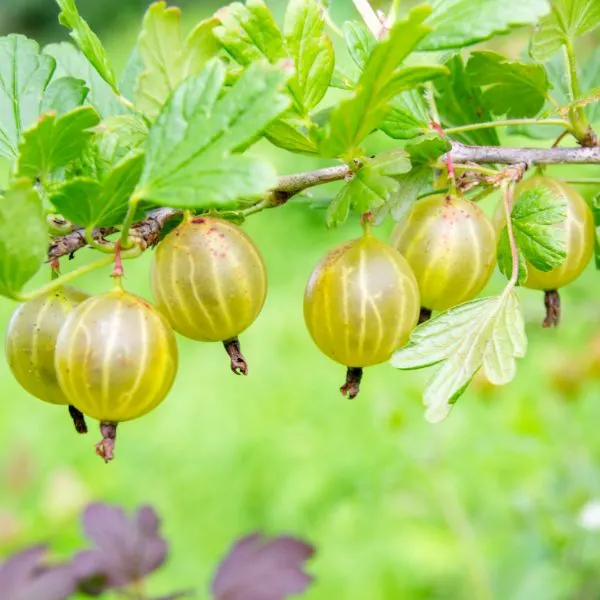
You want to avoid planting blackberries with similar brambles, such as raspberries, gooseberries, or brambleberries. This is because brambles have similar growing needs, including their need for sunlight, water, and nutrients.
So, planting them near each other creates a competitive environment with one plant being the loser. When pairing two plants with similar growing needs, you also risk consequences such as stunted growth, impaired physical characteristics, and even the transfer of diseases from one plant to the other.
3. Slow Growing Vegetables
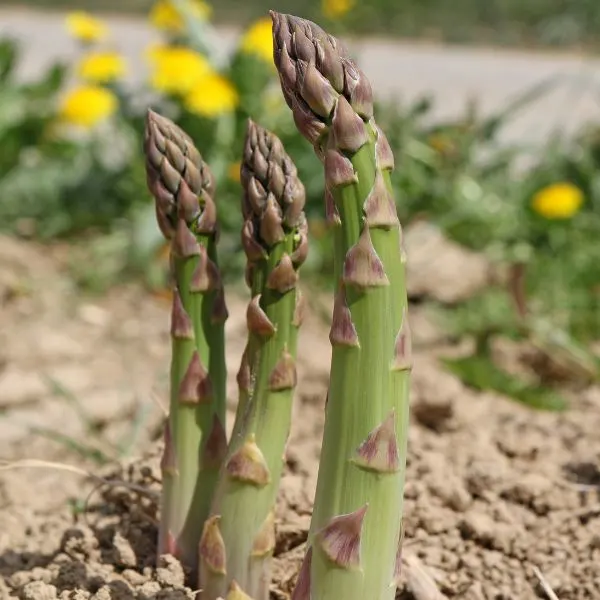
Most slow-growing vegetables don’t grow well with blackberries, either. The most popular example is asparagus. Asparagus typically takes about 3 years for its seeds to germinate. Once they germinate, asparagus requires a lot of nutrients to grow.
This perennial plant requires exposure to full sun for extended periods and rich soils. Due to their slow-growing nature, these plants are also heavy feeders as they need nutrients to fuel their slow-growing rate. Asparagus also grows deep roots and has heavy mineral requirements. This makes them compete with other plants, especially those with extensive root systems.
When paired with blackberries, asparagus compete for similar resources with berries, especially water, and nutrients. It’s also worth noting that slow-growing asparagus can easily take over your entire garden. So, to avoid any issues, if you still want asparagus in your home, put them away in a separate bed.
4. Heavy Feeders
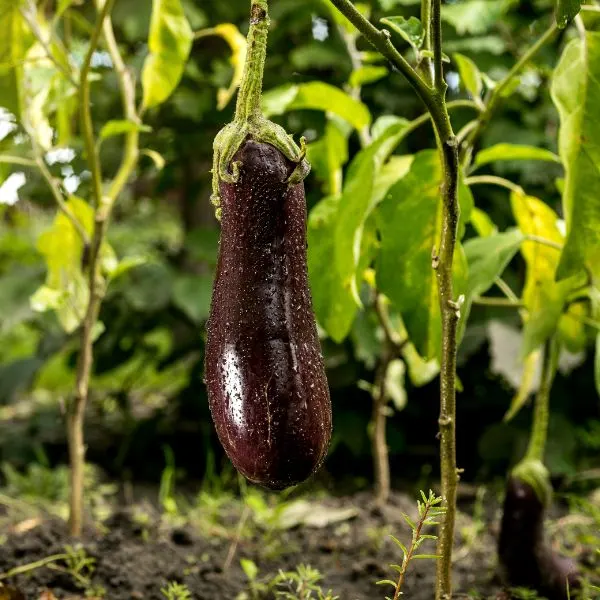
You also want to avoid planting blackberries with heavy feeders. Typically, heavy feeders multiply fast and pull a lot of nutrients from the soil. So, you want to avoid planting blackberry bushes near such plants due to this stiff competition. Heavy feeders include plants such as asparagus and nightshades, such as tomatoes, potatoes, and eggplants.
5. Carrots
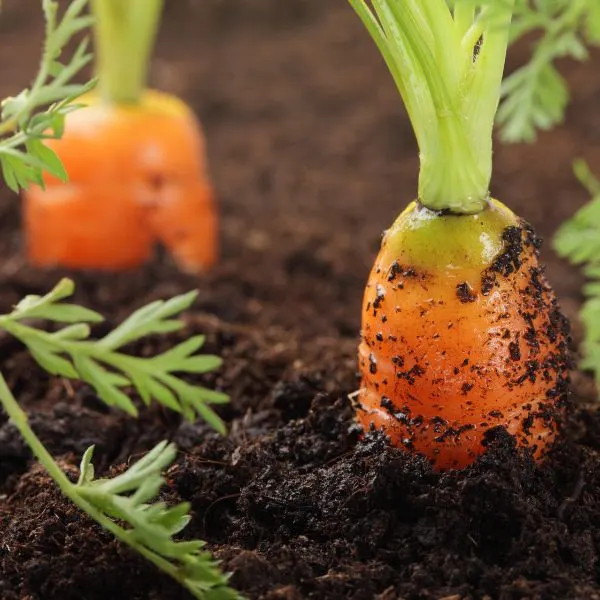
Similar to plants, like asparagus, carrots have deep roots and thrive on rich nutrient requirements. So, they aren’t really the best companion plants for blackberries. However, carrots benefit a lot from planting them near blackberries.
This is because blackberry bushes can help loosen the soil to promote aeration and drainage. On the other hand, incorporating blackberries and carrots in the same area leaves the blackberries susceptible due to the lack of minerals. This results in their stunted growth and ultimately, their death.
Frequently Asked Questions (FAQs)
How Long Does It Take For Blackberries to Produce Berries After Planting?
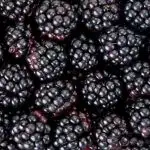
It takes about three years after planting for blackberry bushes to start producing edible berries. The fruiting season for blackberries is usually in summer to early fall, from July to September.
Can You Grow Blackberries And Grapes Together?
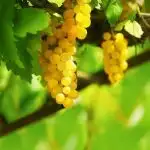
Grapes and blackberries grow well together. Blackberries loosen the soil to allow for easier grape root penetration for better growth. However, when you plant the two plants, make sure you leave enough space for them to spread and grow.
What should you not plant near blackberries?
It’s best to avoid planting other members of the Rosaceae family, like raspberries or strawberries, near blackberries to prevent the spread of diseases and pests that can harm your blackberry bushes.
Where should you not plant blackberries?
You might want to avoid planting blackberries in areas where other related plants, like raspberries or strawberries, have been grown before. This can help prevent the spread of diseases and pests that could damage your blackberry bushes.
What plants that choke out blackberries?
Some plants that can outcompete or overwhelm blackberries include aggressive grasses like Bermuda grass, as well as invasive species such as Japanese knotweed and kudzu.
Do blackberry plants like coffee grounds?
Blackberry plants can benefit from coffee grounds when used in moderation as a fertilizer or soil amendment. Coffee grounds are a good source of nitrogen and other minerals that can help improve soil quality and promote healthy plant growth, just be sure you don’t over do it with them.
Wrapping up
Without a doubt, blackberries grow on their own in tidy bushes, guaranteeing a healthy harvest. However, when paired with the right companion plants for blackberries, you can enrich your garden even better. As evident from the guide above, you can mix up a myriad of these companion plants for artistic and incredible usage of your garden space.
Grow your blackberries under a canopy of companion trees while blending them with other fruit berries and shrubs. Create a beautiful, nutrient-trapping ground cover with herbs while the beautiful companion plants add interest. Blackberries are perhaps some of the best fruit-bearing plants to incorporate in your garden and mix up with other plants, for a completely positive transformation.
More fun articles
